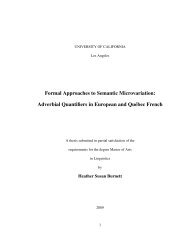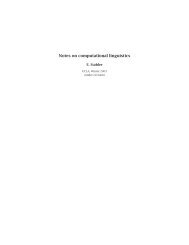Post Verbal Subjects and Agreement in Brazilian Portuguese
Post Verbal Subjects and Agreement in Brazilian Portuguese
Post Verbal Subjects and Agreement in Brazilian Portuguese
Create successful ePaper yourself
Turn your PDF publications into a flip-book with our unique Google optimized e-Paper software.
‘The letters already arrived.’<br />
These examples seem to <strong>in</strong>dicate that while the position of the subject <strong>and</strong><br />
the verb differs <strong>in</strong> SV versus VS unaccusatives (as expected from the different word<br />
orders), the two VS variants seem to pattern together. That is, the cases <strong>in</strong> which<br />
agreement is with a post-verbal DP do not seem to noticeably differ <strong>in</strong> terms of the<br />
height of the subject. Thus, it seems this may not be a plausible account for the BP<br />
alternation.<br />
5.1.2. Diglossia as an explanation for variant agreement<br />
There are prevalent dialects of BP that have lost (or are <strong>in</strong> the process of los<strong>in</strong>g)<br />
number agreement on the verb altogether. In these dialects, the follow<strong>in</strong>g sentence<br />
is grammatical:<br />
(99) A-s carta chegou.<br />
The-pl letter.sg arrived.sg<br />
‘The letters arrived.’<br />
This might raise the possibility for a proposal that attributes the two<br />
agreements <strong>in</strong> variant agreement to the availability of two dialects to speakers who<br />
accept it: the no-agreement dialect <strong>and</strong> an agreement dialect. However, this does not<br />
seem to be a possible analysis for three reasons.<br />
First, I tried to control for the availability of the no-agreement dialect, us<strong>in</strong>g<br />
only data from speakers who f<strong>in</strong>d (99) bad or highly questionable.<br />
40

















